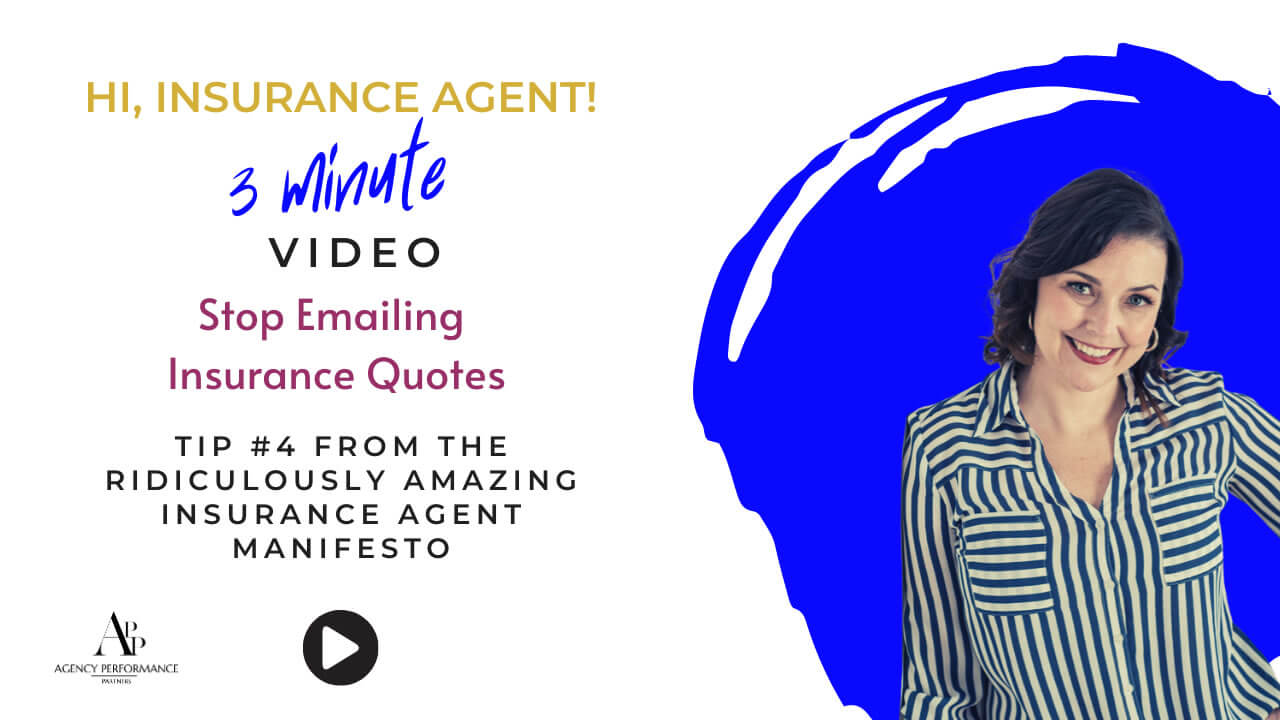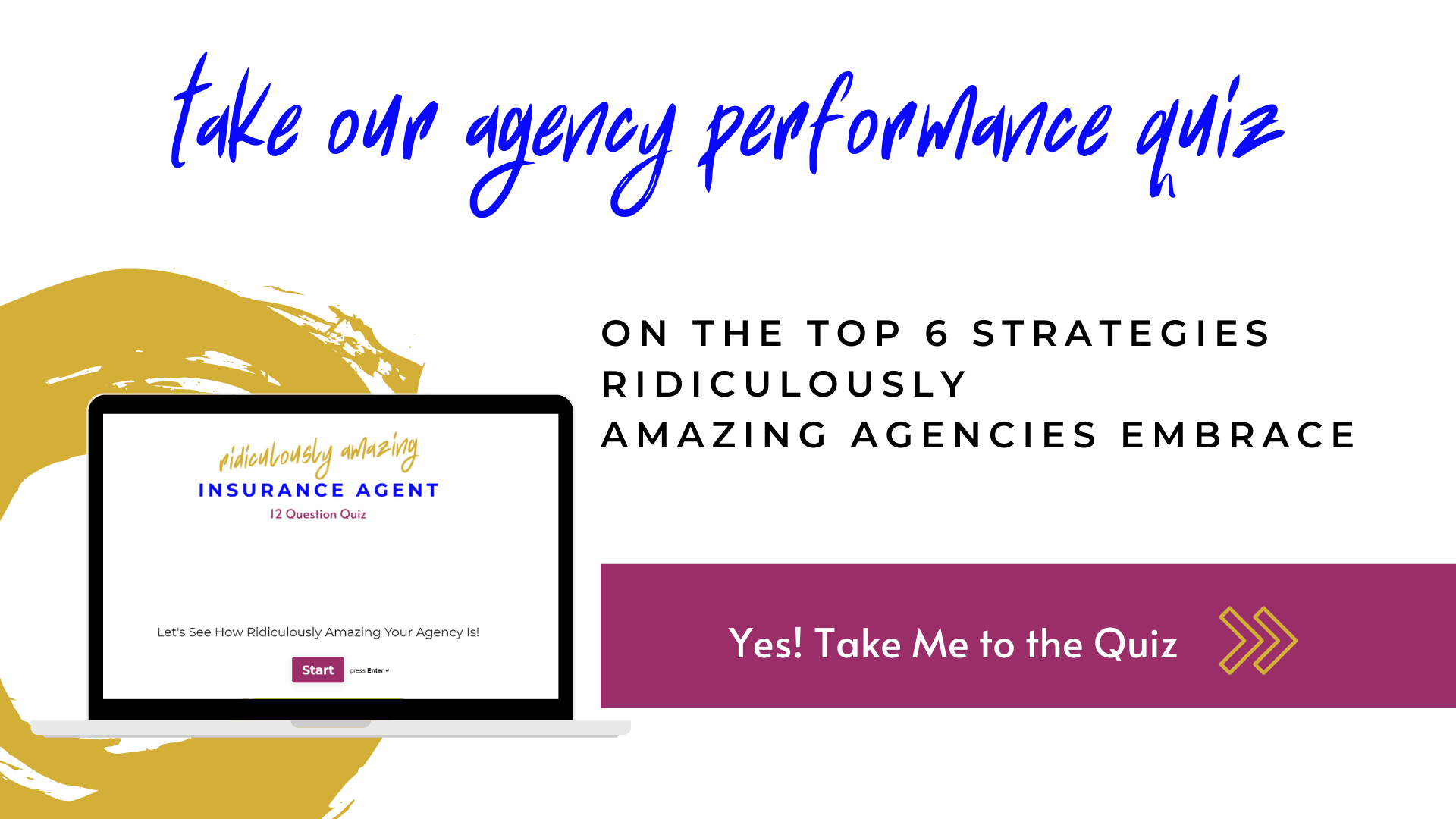Insurance sales strategy can be difficult however, there is one cardinal rule we follow. It could be argued that one should NOT use the absolute terms, “always” and “never”, but here at Agency Performance Partners, we strive to develop ways for your insurance agency to be ridiculously amazing in 2021, so we always say to never email an insurance quote to a client or prospect. This is the top insurance sales strategy we want to drive home to all insurance agents.
Please have a conversation with the client or prospect first. We’re going to outline why here.
Also, it’s no wonder that this topic is one of our high performing videos on YouTube. When we conduct a “Secret Shopper Call”, ALL agencies, as in 100% of those insurance agencies that we call upon, emails the quote to the prospect!
Let’s outline 5 key reasons on why we advise against emailing a quote whether it is when you are conducting an annual review with an existing insurance client or quoting new business with a prospect.
Here are 5 reasons your insurance sales strategy is not email a quote:
It’s simply confusing to the insurance buyer.
As Don Miller of Story Brand says, “If you confuse, you lose.” Whether you are a seasoned insurance professional with decades of experience or just starting out, you’re trained to understand what to look for in a quote.
They aren’t concentrating on basic elements such as:
- Are the liability limits on my Auto and Homeowners insurance policies sufficient to protect my net worth?
- If I get sued, will this policy cover me for the medical bills sustained by the injured party?
- If there is a “flood”, what coverage would cover water in my basement? An insurance buyer doesn’t know the terminology such as Water and Sewer Back Up compared to Flood insurance.
If someone is confused, you can possibly trigger a non-response. They may zone out, shut down and move on to the next Insurance Broker who will satisfy their buying strategy. Your insurance sales strategy should be to educate the client on what you recommend and then only email if you have to!
Let’s consider this scenario. When you need to get your car repaired and you meet with your mechanic and they advise that you “need some work done”, do they email work order that outlines the parts and labor that are required to fix the problem?
They don’t.
They call you to explain what is the issue on why it’s not working, the solution to fix the problem and then ask how you want to proceed.
Insurance is vital in how it protects families and businesses against costly catastrophes that could deplete finances that took years to accumulate. We don’t want to overwhelm people with a few pages of inarticulate data when an otherwise friendly conversation with clear communication can ease the client or prospect into an important and educated decision.
If you email a quote to a client or prospect, they will care about reading one thing: price. (That’s not the insurance sales strategy you want!)
The client/prospect isn’t contemplating all the variables that go into how that price was generated. They care about how much will be deducted from their bank account every month. This can actually hurt your insurance sales strategy.
Remember, for the client, they are required to buy certain types of insurance, so they don’t view it as a valuable resource that protects them, they view it as an expense thrusted upon them because they bought a house or a car.
They enjoy the luxuries of these items, but when it comes to the insurance, it’s an expense. This is why they will pace forward to the price.
As an insurance professional, you deliver so much value, but if you sell on price, you don’t get the opportunity to share your value because now you have to defend the price if that becomes an objection.
Additionally, people make bad decision when they rely on the dollar amount of what something costs vs. the value of the relationship you’re looking to build.
Your goal is to deliver value by educating your clients so they understand that the insurance products you’re selling to them will protect their hard work.
When create the opportunity to have a conversation with a client or future client, you prepare the client with options to what they’re buying because you can share how the policy is constructed.
Remember our Water and Sewer Back up example? They may not realize that the quote includes this coverage but when you share with them that if there is pipe burst or a sewer leak and their basement is flooded, the policy will covers it.
They will feel better knowing the only thing they need to do is call you when an incident occurs, get a clean up crew on the scene and how to file a claim.
If they have a price in mind and the quote you emailed is higher than that price, they are moving on to find something, anything that meets their expectation. You lose that opportunity to talk about what is included with the quote.
This leads us to the time it takes to prepare the quote/price and write the email we are asking you not to send. This is your hard work and the agency’s proprietary information.
If your initial conversations with a prospect reveals that they already have an insurance broker, do you think there could be a chance that they’ll send your quote to their existing Broker to see if they can match your lower price?
Do you really need to practice quoting? No, you don’t.
Finally, we recommend providing at least three options. That means we’re triple emphasizing that you NOT send quotes or options via email before having a conversation.
You want to discuss these options to give the client control over their decision-making process and how they consider working with you because you’ve taken the time to get to know them. Again, this is the difference between delivering value and taking orders.
Our entire manifesto is about you being ridiculously amazing in 2021. This is why we cannot emphasize enough to stop emailing quote and pick up the phone whether it’s to review the quotes or to schedule a time to speak.
If the client asks why not just send the quote, we suggest you prepare a script to genuinely and respectfully respond to this question. We have scripts prepared for when you encounter these type of exchanges within the sales process.
Check out our store here so you can see the resources we have readily available for you and your team to be ridiculously amazing.





